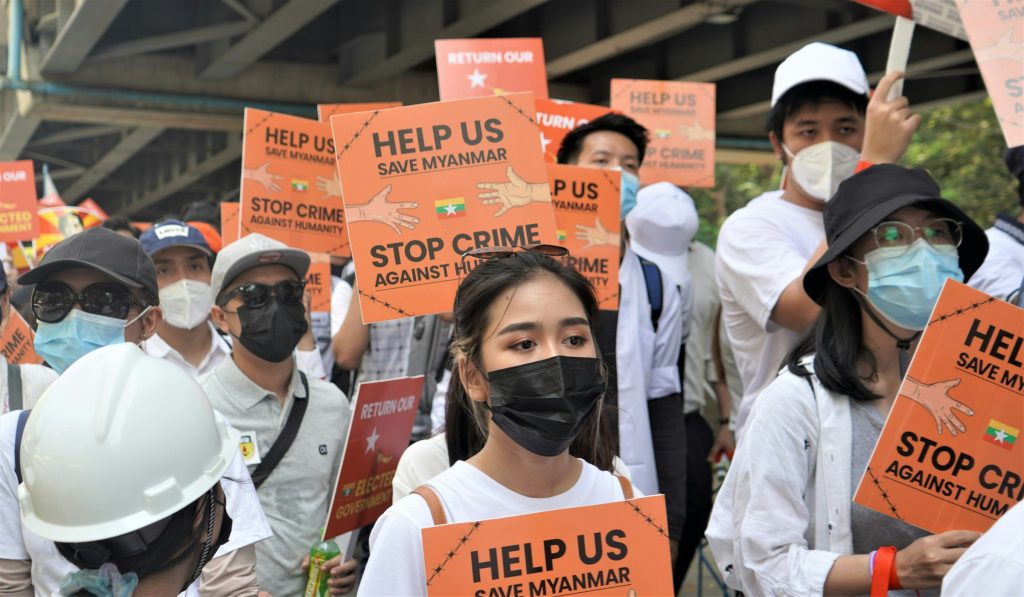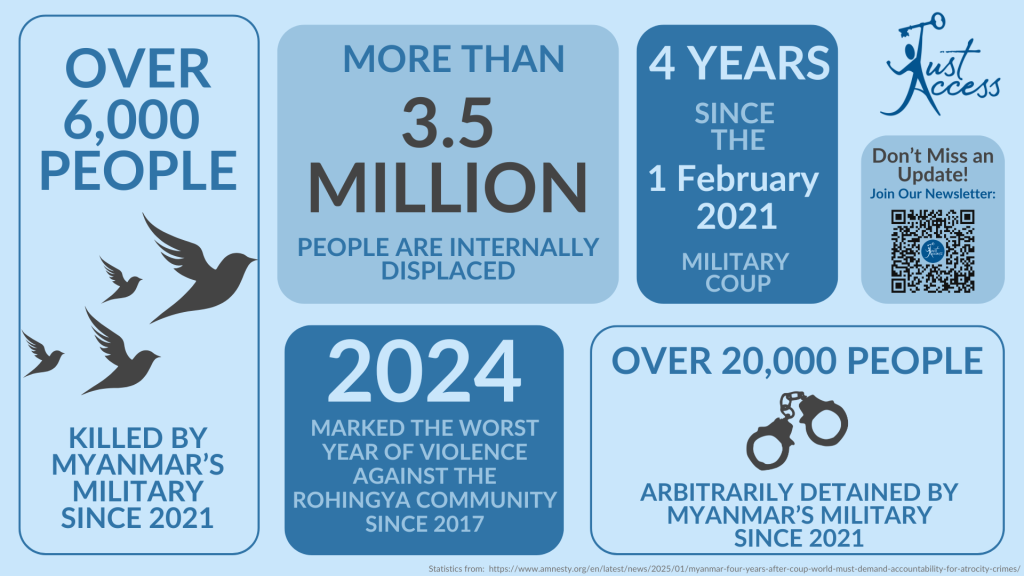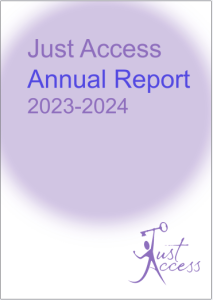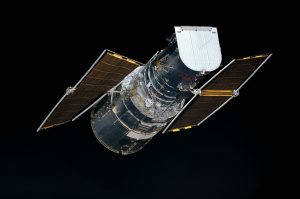
Zinovia Verikokidi
Just Access Representative to the Coalition for the International Criminal Court
Myanmar‚Äôs ongoing crisis has raged since the 1st of February 2021, when Myanmar’s military, known as the Tatmadaw, seized power in a coup, abruptly dismantling the country’s fragile democracy. ¬ÝThe fallout has been catastrophic:¬Ý 3.5 million people have been displaced, and an estimated 18.6 million will need humanitarian assistance by the end of 2024. ¬ÝMyanmar now ranks among the deadliest conflict zones worldwide, with fatalities surpassed only by Ukraine and the occupied Palestinian territories.
In response, the international community, including the US and the EU, escalated trade sanctions against Myanmar. ¬ÝHowever, these measures have been criticised by human rights defenders and academics for lacking the necessary force to bring about meaningful change.¬Ý A key point of contention lies in the selective use and withdrawal of trade preferences. Driving this debate is the question: why are some major powers hesitant to enforce them? The following paragraphs will give some insights into the applied trade-restrictive measures on Myanmar, their compliance with WTO and their effect on human rights.
Myanmar now ranks among the deadliest conflict zones worldwide, with fatalities surpassed only by Ukraine and the occupied Palestinian territories
The Role of the GSP in Myanmar's Trade Relations
In contemporary international legal discourse, the Latin term “sanctions” refers to measures of influence—economic, political, or military—applied to states that violate international agreements. Sanctions, particularly economic ones, serve various purposes and are employed to achieve specific goals. The economic sanctions encompass, among others, a range of trade restrictions, both direct and indirect, including but not limited to embargoes, anti-dumping measures, and economic boycotts. Trade sanctions, as restrictive measures, restrict exports and imports to deprive a target country of crucial goods that could exacerbate its situation. When the imposing country holds significant sway in the global market, this can force the sanctioned country to incur higher costs for alternative imports. Following the implementation of sanctions, the target country may experience fluctuations in import and export prices.
Under the WTO framework, certain provisions grant developing countries additional rights, referred to as “special and differential treatment”. These provisions serve as exceptions to the General Agreement on Tariffs and Trade (GATT 1947). While GATT’s first article prohibits discrimination among member nations, establishing the principle known as the “most favoured nation” (MFN) clause, special and differential treatment provisions allow for deviations from this principle to support the needs of developing countries. One such provision is the Enabling Clause which allows developed countries to provide differential and more favourable treatment to developing countries under certain conditions. The Enabling Clause also serves as the foundation for the Generalized System of Preferences (GSP). The GSP extends non-reciprocal preferential treatment, such as zero or reduced import tariffs, to goods from developing countries. The countries offering these preferences unilaterally determine which goods and nations are included in their programs.
The US reserves the right to withdraw these preferences if the beneficiary fails to meet criteria like respecting worker rights and maintaining a fair market economy. Similarly, the EU‚Äôs GSP allows for zero or reduced tariffs for exports from developing countries, promoting economic growth. ¬ÝBefore the 2021 coup, Myanmar benefited from the GSP under both the US and EU frameworks. ¬ÝIn fact, the EU reinstated Myanmar‚Äôs GSP status in 2013, a status previously withdrawn due to systematic human rights violations.
Support our work!
We can only do our work thanks to the support of brave, passionate people like you!
Your donation will help us to keep fighting for human rights and access to justice for everyone, everywhere.
Diverging Responses to Myanmar's Ongoing Crisis: the US vs. The EU
On the 29th of March 2021, following the coup, US Trade Representative Katherine Tai announced the immediate suspension of its engagement with Myanmar under the 2013 Trade and Investment Framework Agreement (TIFA), initiating a review of Myanmar’s compliance with international worker rights standards. ¬ÝIn contrast, three years later, the EU still has not suspended Myanmar’s GSP status. ¬ÝMyanmar continues to export goods like rice, textiles, and precious stones under the Everything But Arms (EBA) scheme, fully utilising its preferential access to the EU market.
To better understand the trade dynamics between the EU and Myanmar, it is beneficial to examine EU‚ÄìCambodia relations. ¬ÝMyanmar and Cambodia are both classified as ‚Äúleast developed countries‚Äù by the UN and are both eligible for the EU‚Äôs EBA. ¬ÝFurthermore, both countries are members of the Association of Southeast Asian Nations (ASEAN) and discussions regarding the potential suspension of the GSP scheme for both countries occurred almost simultaneously within the EU.
The EU's approach to withdrawing trade preferences significantly differs from its policy implementation in the case of Cambodia
Similar to Myanmar, the EU was Cambodia’s fourth-largest trading partner. ¬ÝIn 2022, Cambodia exported goods worth ‚Ǩ5.5 billion to EU markets, compared to Myanmar’s ‚Ǩ4.3 billion. ¬ÝRegrettably, the similarities between Myanmar and Cambodia extend beyond trade to their political landscapes. ¬ÝBoth nations have experienced political environments marked by a lack of genuine democratic processes and authoritarian governance. ¬ÝIn Cambodia, the ruling Cambodian People’s Party has retained power by banning the main opposition party and securing all the National Assembly seats, effectively establishing a one-party state.
Nevertheless, the EU’s reluctance to withdraw trade preferences sharply contrasts with its stance toward Cambodia. ¬ÝDespite the similar human rights records of these States, the EU imposed stricter trade penalties on Cambodia for human rights violations while maintaining Myanmar‚Äôs trade privileges. ¬ÝSome scholars argue that the EU’s differential treatment may reflect a more strategic interest in maintaining trade relations with Myanmar.

The Question of Justification
The EU’s approach to trade preference withdrawals raises a key question: is its reluctance to sanction Myanmar based on geopolitical interests or a genuine commitment to human rights? The uneven application of trade measures suggests a broader issue—whether special and differential treatment is being applied consistently across countries.
Under WTO rules, tariff preferences can be granted to support development, but their withdrawal as a form of pressure is more complex. The Enabling Clause requires that similarly situated countries be treated equally, yet Myanmar and Cambodia have faced different responses. This inconsistency raises concerns about the legitimacy and effectiveness of using trade preferences to promote human rights and democratic values.
Is the EU's reluctance to sanction Myanmar based on geopolitical interests, or a genuine committent to human rights?
While the U.S. withdrawal of GSP preferences appears WTO-compliant, the EU’s selective enforcement could contradict WTO principles of non-discrimination. If trade sanctions are becoming a tool of foreign policy rather than a development mechanism, clearer rules on negative conditionality are needed to ensure a fair and predictable system.

Can the big powers truly justify their actions—or lack thereof—to Myanmar's Ongoing Crisis?
At the end of 2024, Myanmar’s ongoing crisis had displaced over 3.5 million people, according to UN investigators. ¬ÝReports indicate a disturbing rise in human rights violations, including systematic torture, gang rapes, and abuses against children, with crimes perpetrated by the military escalating at an alarming rate.
As the situation continues to deteriorate, it remains important to question the motivations behind these decisions and to scrutinise whether they align with the principles of justice and human rights they claim to uphold. ¬ÝIn line with the questions raised by the European Parliament, the central issue remains whether the European Commission intends to initiate the process for the temporary withdrawal of GSP preferences from Myanmar under the current GSP Regulation or if progress in poverty eradication is a sufficient argument for prolonging these preferences.
Subscribe to the Just Access newsletter
Don’t miss any of our great blog posts, or any of our great content!
Stay up to date with our work by subscribing to the Just Access Newsletter (six mailings per year).









